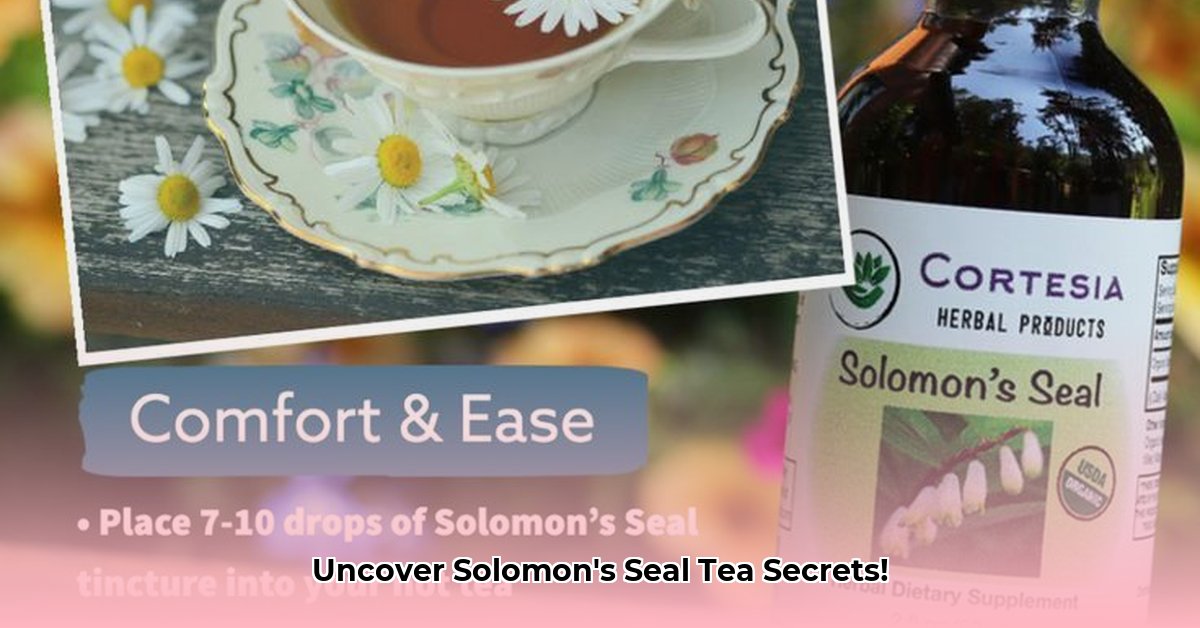
Understanding Solomon's Seal and its Traditional Uses
Solomon's Seal, a plant steeped in history and tradition, boasts a long association with herbal remedies. For centuries, various species of Polygonatum have been used in traditional medicine systems across the globe, most notably for their purported ability to soothe inflammation and support joint health. These uses are rooted in centuries of anecdotal evidence and passed-down practices, highlighting the plant's enduring role in folk healing. However, it's crucial to approach these historical claims with a balanced perspective, recognizing the need for modern scientific validation. Is there a basis in fact for these time-honored applications? Let's examine the evidence.
Exploring the Potential Benefits: A Scientific Overview
While traditional uses abound, rigorous scientific studies on Solomon's Seal's benefits remain limited. However, some research hints at potential mechanisms that could explain its purported effects:
Anti-inflammatory Properties: The presence of allantoin, a compound known for its anti-inflammatory and antioxidant properties, may contribute to Solomon's Seal's traditional use in treating inflammation and joint pain. Dr. Anya Sharma, PhD, Professor of Botany at the University of California, Berkeley, notes "While allantoin's presence is promising, more research – particularly clinical trials – is needed to definitively establish its contribution to any therapeutic effect in humans."
Stress Adaptation: Some proponents suggest Solomon's Seal may help the body adapt to stress, potentially promoting a sense of calm and balance. However, this area requires significant additional research before any conclusive statements can be made.
Digestive and Respiratory Support: Traditional medicine also associates Solomon's Seal with improved digestion and respiratory function. However, substantial scientific evidence to support these claims is currently lacking.
It's vital to remember that correlation does not equal causation. While traditional uses suggest benefits, the scientific community requires more comprehensive research to confirm these effects and understand the underlying mechanisms.
Important Safety Considerations: A Cautious Approach
Despite its long history, several safety considerations warrant careful attention:
Cardiac Glycoside Convallarin: Some Polygonatum species contain convallarin, a cardiac glycoside. While generally present in small amounts, individuals with heart conditions should exercise extreme caution or avoid Solomon's Seal tea entirely. Dr. Elias Vance, MD, Cardiologist at Stanford University Medical Center, cautions that "Individuals with pre-existing cardiac conditions should absolutely consult a physician before using any herbal preparations containing potentially cardioactive compounds like convallarin."
Toxicity of Berries: The berries of Solomon's Seal plants are toxic and should never be ingested. Only the roots should be used for tea preparation.
Product Quality and Consistency: The quality and composition of commercially available Solomon's Seal products can vary significantly. Choose reputable suppliers who provide clear labeling, sourcing information, and quality testing results.
Potential Drug Interactions: Before using Solomon's Seal tea, consult your doctor or pharmacist, especially if you are taking medications for heart conditions, blood thinners, or other drugs. Potential interactions could lead to adverse effects.
Preparing Solomon's Seal Tea: A Step-by-Step Guide
If you decide to try Solomon's Seal tea, follow these precautions:
Source Selection: Purchase dried Solomon's Seal root from reputable herbalists or suppliers known for quality control and transparent sourcing practices. Verify the species used, ensuring it's appropriate for medicinal use.
Tea Preparation: Use approximately 1-2 teaspoons (depending on recommendations from your chosen supplier) of dried root per cup of boiling water. Steep for 10-15 minutes. Do not exceed the recommended dosage.
Gradual Introduction: Begin with a small amount of tea and monitor your body's reaction. Observe for any unusual symptoms.
Professional Guidance: It is imperative to consult your healthcare provider before incorporating Solomon's Seal tea into your regimen, especially if you have pre-existing health conditions or are taking other medications.
Risk Assessment Matrix: Navigating the Potential Downsides
| Factor | Risk Level | Mitigation Strategies |
|---|---|---|
| Convallarin | Moderate to High | Avoid if you have heart conditions; consult a doctor |
| Inconsistent Product Quality | High | Choose reputable suppliers; verify product certifications |
| Accidental Berry Ingestion | High | Use only the root; store berries out of reach |
| Insufficient Scientific Data | Moderate | Use cautiously; monitor your response; consult a doctor |
This matrix highlights the potential risks associated with Solomon’s Seal tea and suggests practical strategies for minimizing those risks. Remember, responsible use requires informed decision-making and professional guidance.
Key Takeaways: Balancing Tradition with Modern Caution
Solomon's Seal holds a significant place in traditional medicine, with a history of use for inflammation and other ailments. While some research suggests potential benefits, particularly related to allantoin's anti-inflammatory effects, robust scientific evidence remains insufficient. A cautious approach is essential, prioritizing safety and seeking expert advice. Remember, consulting your doctor before using Solomon's Seal tea – or any herbal remedy – is a crucial step in prioritizing your health and well-being.